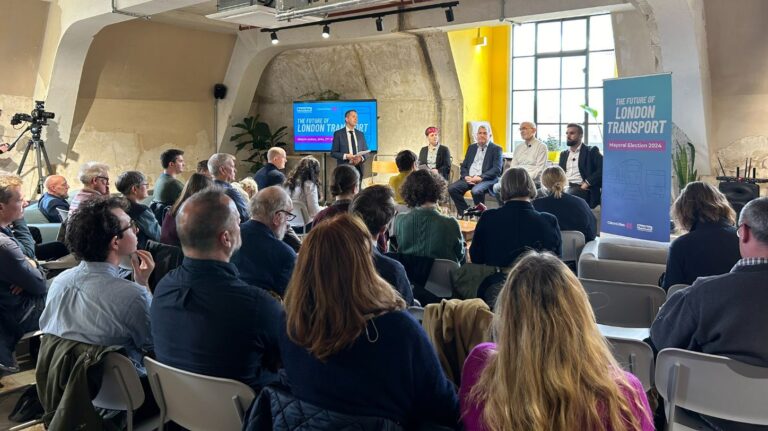Several of London’s mayoral candidates and their parties’ representatives have presented how their policies and priorities will help to shape the future of transport in the UK capital during an event held at London’s County Hall.
The Future of London Transport Mayoral Hustings was held on 17 April at Sustainable Ventures on the fifth floor of County Hall on London’s Southbank, ahead of the 2024 London mayoral election next month.
Speakers included Liberal Democrat representative Chris Maines, Conservative Party representative Andrew Boff, Labour Party representative Mete Coban, and Green Party candidate Zoe Garbett.
Hosted by moderator Rob Lydall, the panel faced a series of questions based around the future of London’s transport, its current levels of efficiency and public accessibility, as well as how each candidate or their party’s candidate planned to solve critical challenges including the cost of living crisis, deaths and serious injuries from road collisions, air pollution and climate change.
Steve McNamara, general secretary at Licensed Taxi Drivers Association, questioned the panel on how each party would respond to the difficulties of taxi drivers navigating London amidst tighter regulations.
He said: “In London, 65% of our fleet is now electric. We’ve firmly bought into the mayor’s Clean Air Plan.
“London has now got the cleanest cab fleet on the planet, and we’re increasing it at a rate of about 200 [taxis] a month, £550m invested in buying electric vehicles.
“Although 20% of the journeys we do also relate to mobility, disabled people with accessibility problems, and some of those drivers are funded through the London Council through a taxi card scheme, the London mayor has excluded us from full access to 18 boroughs.
“How are you going to bring unity to the transport scheme around London?”
Member of the London Assembly, Boff, said: “Black cabs should be able to access everywhere a bus can, it’s a simple as that. [Conservative candidate] Susan Hall will negotiate with the different boroughs because, unfortunately, they have the control right now.
“But there’s got to be an agreement that makes it easier for cabbies and for people wanting to access buses.”
Labour councillor for Stoke Newington and Hackney Council’s executive member for the environment and transport, Coban, agreed: “From a user perspective, from a resident’s perspective, that is an inconsistency, so I agree that it needs to change.
“Because of the ANPR cameras, which get access to license plates through the government and councils, there’s a lot of GDPR complications there that prevent that.
“What I will say is just because things don’t happen overnight, that doesn’t mean it won’t happen tomorrow.”
READ MORE: Bill to allow pedicabs in London to be regulated passes Parliament
Richard Douglas for CoMoUK, a national organisation for shared transport and charity promoting its social, economic and environmental benefits, referred to former London transport commissioner Lord Peter Hendy and claims that the most important document he had on transport for the whole of London was planning for smaller car spaces.
Thus, he asked what each party’s response was to this and any future legislation. The Green Party’s Garbett said: “I think cars should get smaller and the space given to cars should do too.
“I think a pay-per-mile [road user charge] offers a solution here. It’s all about distance travelled, type of car, the size of the car, damage to the roads from the vehicle, and the pollution – it can take into account all these things and is a fairer system.
“It’s a really exciting time for us to look at how we influence the way our city is developed and how we plan infrastructure. That’s where industry organisations come in because they’ve all got brilliant ideas that we need to make sure are reflected in the next London Plan. I see that as a real opportunity,” said Garbett.
Labour’s Coban was quizzed on the subject of a pay-per-mile road-user charge, in relation to the accuracy of current London mayor Sadiq Khan’s 2023 book Breathe, in which he wrote that “we have plans to introduce a new, more comprehensive, road-user charging system”.
Boff asked Coban: “Either that book is right or it is wrong. Is he going to bring in pay-per-mile? Because he says so in the book and if he says no now, does that mean the rest of the book is wrong as well?’
Coban replied: “Firstly that is a personal book, it is not the manifesto for London.
“I think the key thing here is that – and I want to be very clear about this – is that Sadiq has ruled out pay-per-mile for now.”
Referring to the London Plan mentioned by Garbett, Liberal Democrat candidate for the London Assembly Chris Maines said: “This is the document that will be the mayor’s blueprint for the future, it’s something that looks 25, 30 years ahead.
“It’s far more important than what happens in manifestos where everybody’s talking about the short term.
“We need to step back and have much longer planning. That’s important.”
Each party will continue to campaign ahead of the 2024 London mayoral election, which is due to be held on 02 May 2024.
The Future of London Transport Mayoral Hustings was supported by more than 20 organisations including Clean Cities Campaign, Mums for Lungs, Green Alliance, Campaign for Better Transport, Electric Vehicle Association England, Centre for London, British Vehicle Rental Leasing Association, Asthma & Lung UK and Friends of the Earth.
Achievements and innovations in sustainable urban mobility will be celebrated at the third annual CiTTi Awards, which will be held on 26 November 2024 at De Vere Grand Connaught Rooms in London. Nominations are open now! Please visit www.cittiawards.co.uk to learn more about this unmissable event for the UK’s transportation sector.





